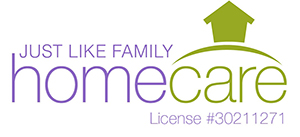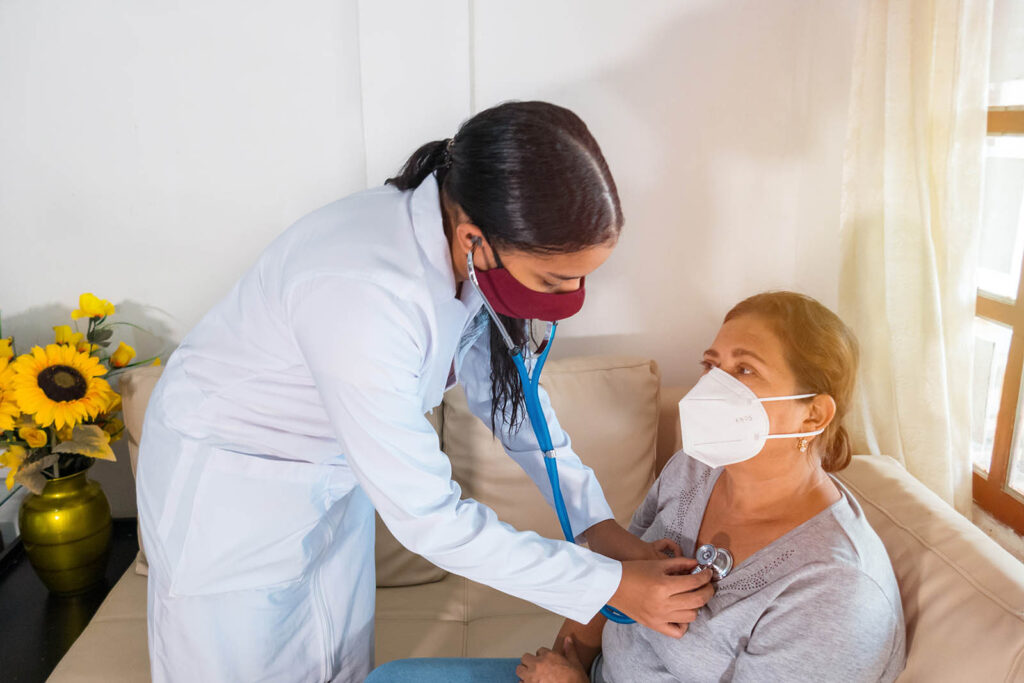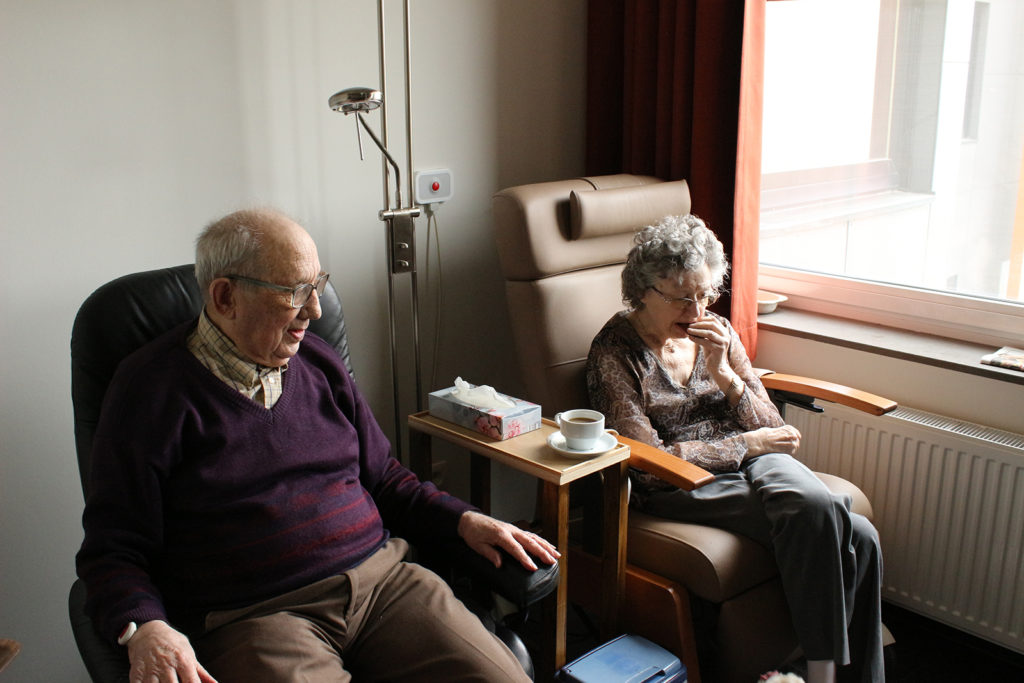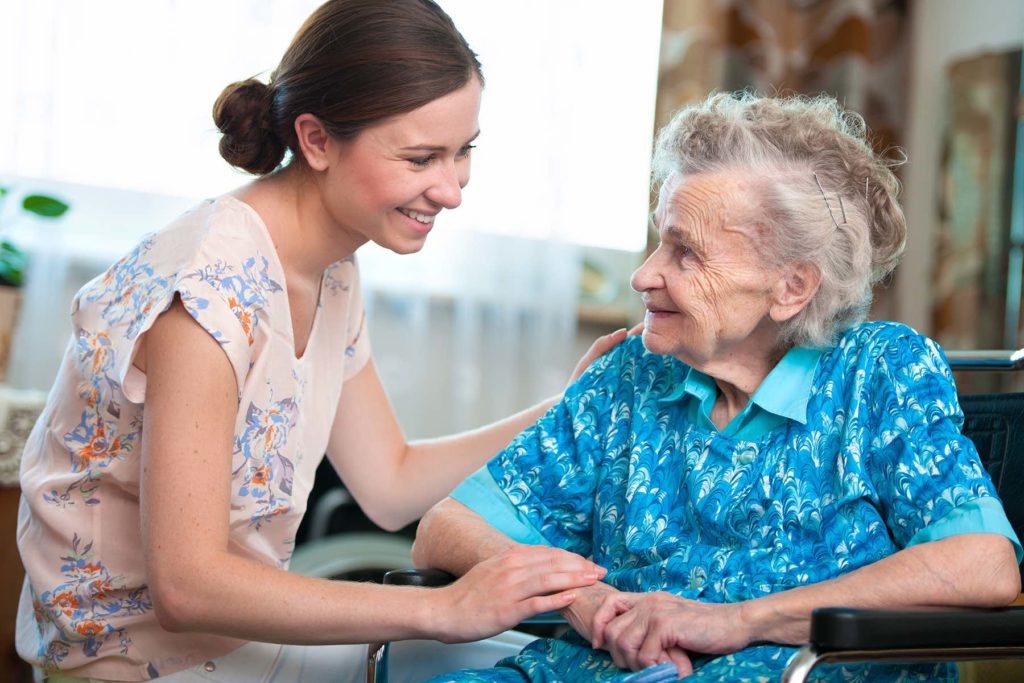Planning for Care
Why In-Home Caregivers Are Vital for Keeping Seniors Safe During COVID-19
March 25, 2021

Older adults with COVID-19 are at a higher risk of developing serious symptoms.
This has been a hard time for seniors and their family members. COVID has left many seniors isolated in their homes, unable to see family and friends.
Home care providers offer essential services during the pandemic. Traditionally, caregivers assist with vital tasks such as dressing, bathing, medication reminders, grocery shopping, and preparing meals. Now, caregivers have another important job — protecting seniors from COVID-19.
Here’s more information about how caregivers can help during the pandemic.
How Your Caregiver Can Help
As the nation’s most vulnerable group, caregivers can offer senior health guidance as well as emotional support during this scary time. Here are the services you can expect when hiring in-home caregivers during COVID-19.
Communicate With Loved Ones
There are some seniors who haven’t seen their family and friends in a year due to the pandemic. If seniors don’t have a full grasp of technology, they may not be able to effectively communicate with their loved ones.
Caregivers can find creative ways for seniors to communicate with family and friends. From video chats sharing pictures, caregivers can help a senior set up their mobile device for multiple communication tactics.
Some seniors prefer the old-school way of communicating, such as sending letters and cards. If a senior is unable to write, their caregiver can write their message and send the letters and cards.
Proper Hygiene and Cleaning
Keeping seniors safe is essential during the COVID-19 pandemic, and the first place to start is by cleaning and sanitizing the home regularly. But not all seniors can commit to a regular cleaning schedule. Fortunately, caregivers can properly clean a senior’s home and disinfectant any high-touch surfaces.
Some high-touch surfaces they will clean include:
Light switches
Doorknobs
Cabinets
Counters
Remote controls
Phones
Handles
Faucet
Toilet
In addition, a caregiver can make sure seniors are properly bathed, can do their laundry, and make sure they wash their hands regularly.
Maintain a Routine
While in isolation, following a routine can be difficult. This is especially true for seniors, specifically those with Alzheimer’s. Caregivers know the importance of following a routine, so they will help seniors with their daily tasks.
Seniors also appreciate a caregiver’s routine visit. They feel safe with their caregiver and knowing their caregiver will visit at specific times will provide comfort.
Provides Comfort to Families
Keeping seniors safe during COVID-19 is a priority for loved ones. Unfortunately, this means families can’t or shouldn’t visit their senior loved ones, which causes a lot of worrying. This is especially true in regard to medical emergencies, when their loved ones may not be there to help.
Knowing a caregiver is there daily can help loved ones feel at peace. In case there is a medical emergency, their loved ones have someone there to respond to the situation.
The caregiver will also be a family’s point of contact to ensure everything is going smoothly with their family member. Caregivers can check for signs of COVID-19 and other medical conditions. In addition, caregivers will make sure seniors are mentally healthy, not showing symptoms of anxiety or depression.
Running Errands
Caregivers can also do a lot for seniors even if they’re not at their house. While there are many grocery delivery services, seniors can save money by having their caregivers deliver their groceries. They can also keep them stocked up on their medications, disinfectants, cleaning supplies, and more.
What to Ask a Caregiver Before Hiring Them
A caregiver can provide many benefits to seniors during the time of COVID-19. But you’ll need to choose the best caregiver. Here are some essential questions to ask to know you’re choosing the right caregiver.
What Care Do You Think Is Necessary?
While caregiving is usually necessary, some caregiving in-person visits are discouraged unless the senior needs these services in their day-to-day lives. Caregivers still need to limit their time in person and only provide necessary services.
Because of this, it’s essential you ask what services a caregiver will provide during this time. These usually include delivering medication, groceries, and assisting your loved one with tasks they can’t do on their own.
What Precautions Are You Taking?
While your caregiver prioritizes your and your loved one’s safety, they should also practice their own precautions.
Your caregiver should wear the necessary personal protective equipment (PPE) and undergo regular COVID screenings. The caregiver should always wear a mask, at the least, and many also wear a face shield for extra protection.
All caregivers go through different precautions. Be sure to discuss how they prepare to protect you and your loved one as well as themselves.
What’s My or My Loved One’s Care Plan?
All caregivers will create a care plan for you or your loved one, and it’s recommended you know what plan to expect. This usually includes days and times for grocery shopping, a regular cleaning routine, and when and how you’ll stay connected to loved ones.
Your caregiver should create this plan based on current CDC guidelines. They will also include emergency contacts in this plan.
When Is Telehealth a Better Option?
If you or your loved one are able to stay independent, telehealth caregiving may be a better option.
Some popular telehealth methods include video calls, phone calls, health apps, email, and more. Caregivers will check in regularly to make sure you or your loved one are handling your necessities, are taking any necessary medications, and aren’t showing symptoms of COVID-19.
Home Assistance Protecting Seniors in Florida From COVID-19
Caregivers are necessary if you or your loved one aren’t or are only partially independent. They can monitor seniors’ health, help them perform vital daily tasks, and run errands for them.
But now, home assistance protecting seniors in Florida from COVID-19 is more vital than ever. That’s why it’s essential to hire the best caregivers.
Do you need help finding the perfect caregiver? We can connect you to a variety of caregivers. Whether you need home health aids or live in-person care, you can visit our services page to see how we can help you.
Using an In-Home Care Agency Benefits
November 13, 2020
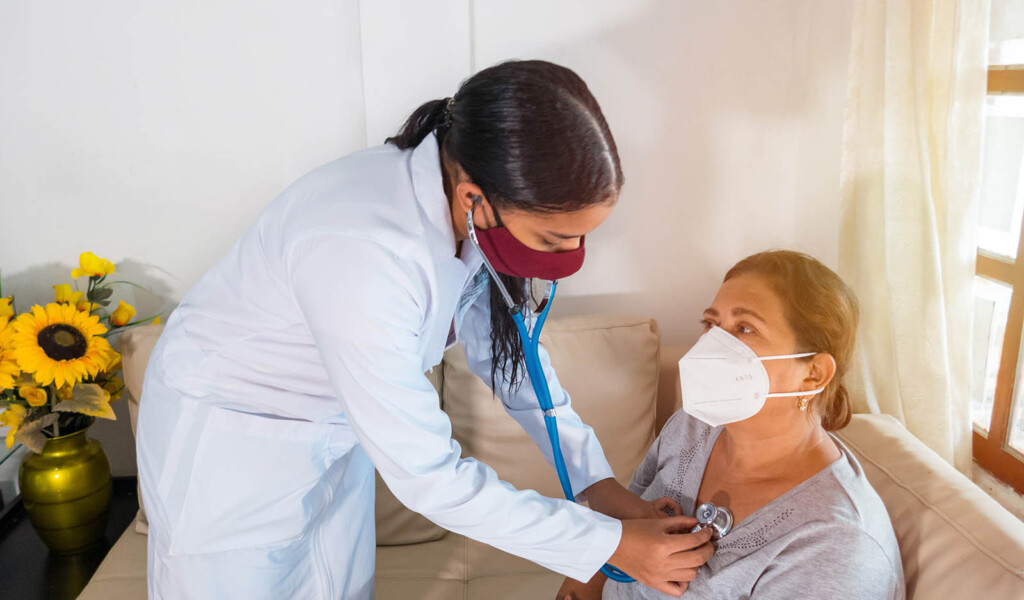
As more members of the population reach their Golden Years, a growing number of families are finding the need for long-term, in-home care.
When it comes to long-term care, you have several options. You can hire an individual that you find in a registry, online, or through a friend. Alternatively, you can hire a licensed caregiving agency.
You could hire an independent caregiver by looking on Craigslist or asking your friends or family members for referrals. However, how would you know if a care provider is well-qualified to care for your family member? Instead, it’s faster and safer to find an independent caregiver through a top-notch registry.
To learn more about the benefits of a care provider registry versus an in-home care agency, keep reading.
Why Should I Use an in-Home Care Agency Registry Service?
When it comes to caring for your loved one, it’s important to know the difference between the various alternatives for finding skilled medical staff. Hiring an independent caregiver will save you a great deal of money. However, how do you know if an independent caregiver is trustworthy and qualified for the job?
If you need to provide ongoing in-home care for a loved one, you may wonder, “Should I hire an in-home care agency?” Agencies train, vet, and insure their staff members—however, an independent caregiver is much more affordable.
The solution is to find a trustworthy registry for in-home care. Of course, you need to find a registry with a stellar reputation.
A registry can help you locate and hire qualified, compassionate caregivers as needed. They can provide you with access to trustworthy, experienced healthcare professionals available for four- or five-day shifts. A reliable registry can even help you to find around-the-clock in-home care if needed.
Are In-Home Care Agencies Worth It?
When your loved one doesn’t receive proper care, many things can go wrong. A premier registry provides you with a series of checks and balances.
For example, the personal issues of an independent caregiver can result in a major problem. A registry will make sure that a professional caregiver is always available to provide care.
Imagine that you hire an independent caregiver from an online ad to watch over your aging loved one. Early one morning, you receive a call. It’s your caregiver.
Unfortunately, their car will not start. Now, you have no one to watch over your family and provide needed care.
At the same time, you’re in charge of running an important meeting at work. You can’t stay at home, but you can’t go to work. What will you do?
If you hired an independent caregiver, you’d have to do your best to find a replacement—and fast. If you can’t accomplish this task, you’ll miss out on assuming your important work responsibilities. You may face the same situation if an independent caregiver becomes sick.
With a registry, however, you have options. A professional caregiving registry can provide you with a backup caregiver.
A full-service in-home care agency can do the same. However, the cost of maintaining staff through a full-service agency can quickly spiral out of control. Alternatively, hiring an independent caregiver through a registry is a much more cost-effective option.
In-Home Care Agency Versus Home Care Registry
Already, you can see the problems that might arise from working with a single independent caregiver. Life happens. People get sick and have problems.
Also, everyone needs a break now and again. A registry will ensure that you can meet these needs.
However, a top-notch registry will also make sure that their caregivers update their skills continually. Conversely, there’s no guarantee that an independent caregiver you find online or through a friend will pursue continuing education.
Choosing a caregiver with a great personality is a good idea. However, it’s also important that a caregiver has the requisite skills to care for your loved one. A caregiver with more personality than skill may end up doing more harm than good.
At the same time, you don’t want to have a revolving door of caregivers. Patients like stability. However, it’s reassuring to know that you can easily access a backup care provider if there’s an emergency.
Still, vetting is the most important benefit of working with a registry. In-home care registries conduct detailed background checks.
Some malicious actors enter caregiving to take advantage of elderly patients. Fortunately, professional registries screen their staff members to ensure that the caregivers who come to your home are safe. A registry, however, enables you to access full-service care—without full-service costs.
Trust a Registry to Keep Your Loved Ones Safe and Healthy
Like most people, you most likely have a life full of responsibilities. At the same time, you must care for and protect your loved one. You must also provide them with companionship.
Today, most people want to age in place. In other words, they want to live their senior years in a home that they love, surrounded by family. An exceptional home healthcare registry can enable your loved one to do just that.
A skilled home care registry will provide you and your family with peace of mind. They’ll give you easy access to independent healthcare professionals who deliver service with compassion and respect.
Most importantly, they’ll make sure that all caregivers are qualified to provide the very best care. An agency will also ensure that you can trust select caregivers to provide safe care for your family.
Don’t Wait! Find the Perfect Caregiver Today
Now that you know the benefits of hiring an independent caregiver through a registry over choosing an in-home care agency, you need a known and trusted registry.
Just Like Family Home Care is your solution for accessing skilled and vetted independent caregivers as needed. We can help you find high-quality healthcare professionals 24 hours a day, seven days a week.
Contact a friendly Just Like Family Home Care rep today at 239-431-6661 or connect with us online. We’re waiting and ready to help you locate the best in-home care available for your loved one.
Time for Home Care? Classic Signs That Someone Needs Help
October 13, 2020
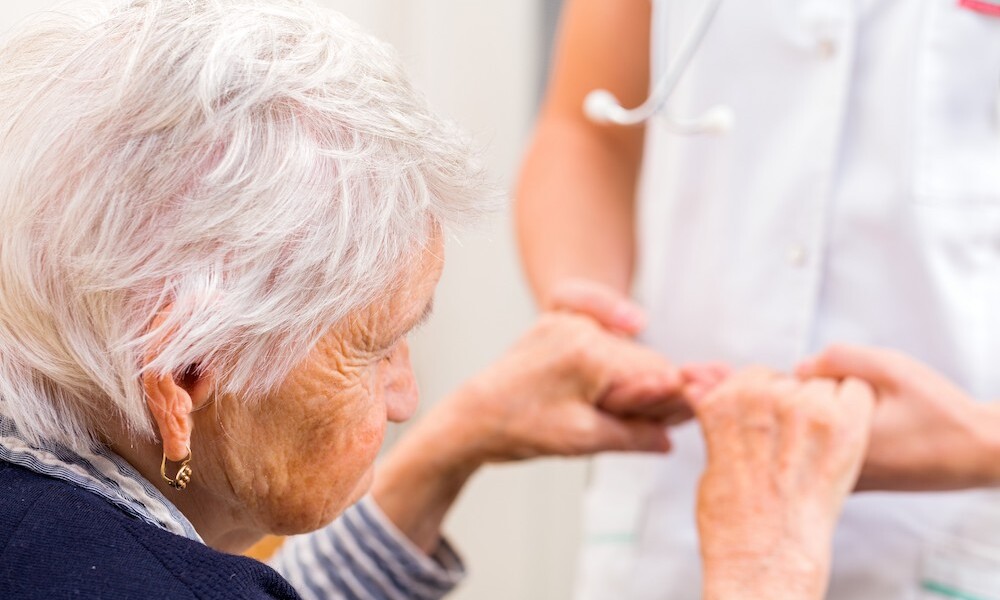
Are you wondering if it’s time to get your elderly loved one the help they need? Do you often find yourself thinking about whether or not to hire a live-in care provider to watch them? If so, then you should consider the signs it’s time to find home care.
It’s never too late to get them the help that they deserve. By looking into senior care, you will experience full peace of mind, knowing that they’re safe.
See below for several signs that it’s time to look into live-in care providers in Naples. It can help you better understand when is it time to get home care for seniors.
1. Not Eating Well
Perhaps you’ve noticed that your elderly loved one hasn’t been eating the same as they once did. Maybe you’ve even noticed that they’re losing a significant amount of weight.
If that’s the case, then they might be skipping out on meals or can no longer operate the kitchen the way that they once did. They might also find it increasingly difficult to run to the store for food items that they need to cook.
A live-in caregiver can give the assistance that they desperately need. They can go out to shop for groceries, come back to the house, and make your loved one the meals that they’ll chow down on.
Once the meal is done, they can also help clean up the dining table and kitchen, wash dishes, and put away all the items for future meals.
Be sure to reach out to a live-in care referral company that can help you find the right caregiver for your loved one’s situation.
2. Slow Recovery Time
Perhaps you’ve grown concerned for your loved one because of an illness or injury that they’ve recently suffered. You have noticed that they’re taking longer and longer to recover from health complications.
These injuries and illnesses might also be more frequent, with no signs of that slowing down any time soon.
If so, then you’ll want someone to be around them 24/7. As much as you’d love to be around them all the time, you still have a career and your spouse/children to care for as well.
Hiring a live-in care provider can help give you peace of mind. Even when you’re not around, there’s a specially-trained and well-educated live-in caregiver that’s watching over them, giving them the best medical attention possible.
Be sure to give your loved one time to adjust to the idea. If you rush them into it too quickly, they might resist the care they’re given.
3. Their Memory Is Fading
Sometimes the biggest sign that your loved one needs help is when you notice that their memory is starting to fade. Sometimes it’s a sign of Alzheimer’s or Dementia, while other times it comes naturally as they age.
No matter what the reason is for the memory loss, it will only continue to worsen. If their memory fails them while no one else is around, it could lead to a very serious situation.
A live-in care provider will work tirelessly to keep an eye on them. They’ve been trained on how to work with patients that suffer from Alzheimer’s and dementia, and how to get them to cooperate in moments of confusion.
4. They Recently Had an Accident
Did your loved one recently fall and injure themselves? Was there a close call that you were (fortunately) there to help them with? If so, then you might be struggling with the eye-opening sign that they need constant supervision.
Not only that, but your elderly loved one might not be comfortable with being left by themselves for any period of time. This is a clear sign that it’s time to get them live-in care from a specialist.
If they were to have an accident while no one was around, then it might lead to a life-threatening situation. They might not be able to reach for the phone to call for help.
5. They Seem Lonely
No one should ever have to feel alone in their own house. As much as you, your kids, and your siblings might try to keep them company, there will always be moments where your elderly loved one is alone.
Not only are those moments a danger to their physical health, but their mental health as well.
Live-in caregivers don’t just focus on giving medical treatment to their patients. They have a passion for taking care of elderly people in need. They will build a friendship with your loved one and find different ways to hang out with them.
That way, even when you’re at work or running the kids around, you’ll know that your loved one is hanging out with a close friend around the clock!
6. They Can’t Drive Anymore
There comes a time where all elderly people can no longer drive. Their worsening health makes it impossible for them to safely operate a vehicle.
With a live-in caregiver, they’ll have access to drive wherever they need to without having to wait for a loved one to pick them up.
That way, you don’t have to adjust your schedule every time they have a doctor’s appointment. The live-in care provider can take them wherever they need to go.
Find the Right Home Care for Your Loved One Today
Now that you have seen several signs that it’s time to get home care for your loved one, be sure to use the right referral service for your needs.
Be sure to read this article for more information on senior loneliness and how you can help them cope with their emotional distress.
For more inquiries, please be sure to reach out via our contact us page and we will be happy to assist you further.
What Is a Live-In Caregiver?
June 11, 2020
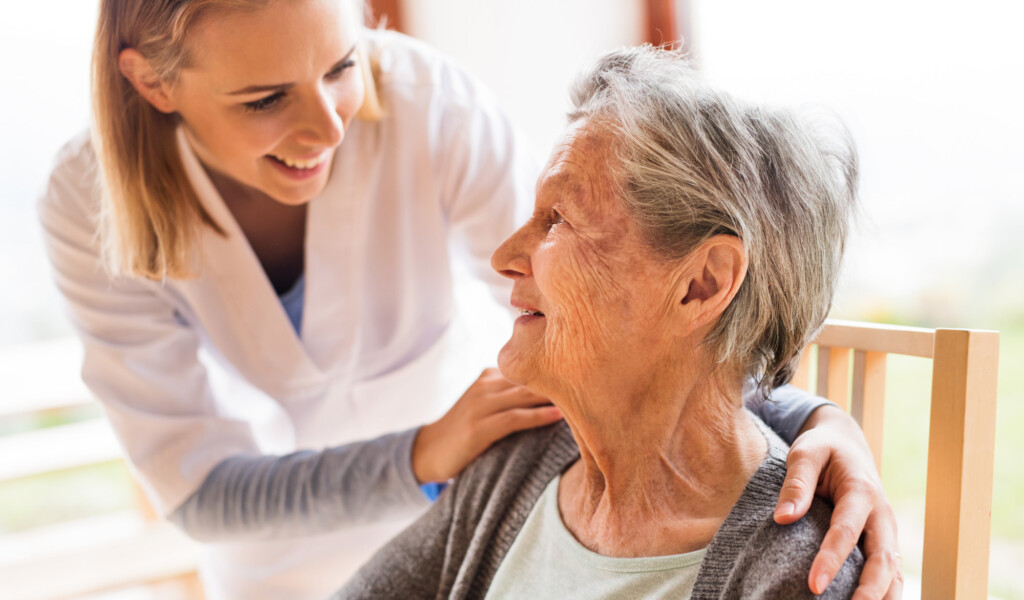
There’s a nagging cliché about life coming around full circle. But, never does it seem more real than when one of our parents starts to visibly age and requires assistance for otherwise-normal activities.
Yet, even as our parents start to age, the rigors of a full-time job don’t seem to dissipate. So, what happens when you want to be there for Mom and Dad, but you still need to draw in a paycheck?
Well, this is where a live-in caregiver steps onto the scene. Whether a caregiver comes to tend to your loved one’s daily affairs while you’re at work or moves in on a more permanent basis to oversee things, they offer tremendous reassurance that everything’s going to be alright.
Below, we’ll break down the details of what, precisely a live-in care provider offers. There are a rainbow of options, depending on your loved one’s needs. And, no matter which direction you take, comfort lies at the core of it all.
Comfort Giver
The first (and perhaps best) way to describe a live-in care provider is a comfort giver. Their presence offers a certain level of comfort for friends and family members who are concerned about the well-being of an elderly loved one.
No longer do sons and daughters have to worry that their elderly parents may have slipped or fallen. No longer do they have to send up a flare if a phone call isn’t answered. It’s established that someone’s close at hand and caring for their every need.
Live-in care providers also provide comfort for someone who’s aging, as well. Consider how we spend our lives curating our home. It’s our safe haven, our safe space.
When the trials of aging start to take their toll, it’s far more reassuring to endure life’s difficulties from the comfort of a living room surrounded by family photos or a bedroom that was painted and decorated by their spouse many moons ago.
Live-In Caregiver vs. Daytime Caregiving
Of course, many of us would love to welcome our elderly parents back into our homes and care for them the way they cared for us as children. Yet, often, the demands of life require us to maintain a daytime job. When our hands become tied like this, there are a couple of options.
Live-In Caregiving
Live-in elderly care means your family member will have an in-home caregiver who works four or five days a week, providing ’round the clock care. So, while you’re at work, your loved one will be cared for. Even if you’re working a double shift, there’s no fear; your loved one will be cared for.
In this situation, the live-in senior caregiver must be provided a bed where they can rest for eight hours a night (with, of course, the stipulation that this sleep may be disrupted by the needs of their client). They’re also given a period of rest during the day where another caregiver can come in or a family member can take over.
Daytime Caregiving
If you’re able to move an elderly loved one into your home, but can’t be around all day, this may be a lovely option for you. A daytime caregiver will arrive to oversee the health and safety of your loved one while you’re at the office.
Typically, when you come home, you’re “on duty” to care for your loved one. But, what’s nice is that the same daytime caregiver can sometimes step in to help with the occasional evening affair. And, of course, if you work an evening shift, then you will be able to find someone who’s available for overnight caregiving until you come home again in the morning.
24-Hour Caregiving
Twenty-four-hour caregiving may sound a bit like live-in elder care. But, it’s actually more intensive. This is for someone who can’t be left unsupervised (i.e., during an eight hour period of rest). Perhaps they’re prone to falls or need constant medical attention.
In which case, 24-hour caregiving is provided by two or three caregivers who work in shifts. There won’t be an eight-hour sleep break or a daytime break. Rather, someone would be “on guard” at all times, providing the utmost care for your aging family member.
Types of Care Providers
Aside from live-in vs. daytime (or nighttime) providers, there are also varying levels of training that you can consider when looking for the perfect match. Here’s a breakdown of some of your best options:
Licensed Practical Nurses & Registered Nurses
A licensed nurse can provide skilled care for a number of situations. They may come in hourly shifts, or more frequently, to administer medication, provide post-surgery care, tend to wounds, provide ventilation care, or monitor vitals.
This is, of course, for someone who needs diligent medical attention or someone who may be recovering from a difficult surgery. Having a registered nurse enter a home is a wonderful way to know your loved one is being cared for by a trusted member of the medical community.
Certified Nursing Assistant
Of course, another member of the medical community that’s not to be overlooked is a nursing assistant or home health aide. These are friendly folks who can assist with everyday activities like bathing, dressing, oral hygiene, shaving, skin care, ambulating/transfer, transport/escort, toileting, supervision, reminder medication, prepare meals/feeding, laundry/change linens and light housekeeping.
A home health aide may fall nicely into the category of daytime care listed above. This is someone who can oversee your loved one’s daily routine, from breakfast to afternoon bridge with their friends, to an early supper before a member of the family arrives home for the evening.
Companion
Another alternative is a companion. This is for someone who’s just looking for a bit of companionship rather than “hands-on care.” Perhaps a companion will drive Mom or Dad to the local movie theatre to catch the latest Tom Cruise film.
Or, maybe they’ll stay at home and enjoy a couple episodes of Grey’s Anatomy while playing a robust game of gin rummy. This is someone who’s going to keep your loved one’s mental health in tip-top shape and also help ward off any feelings of cabin fever.
Does Insurance Cover a Caregiver?
Thankfully, most long-term care insurance will cover the services provided by a registered caregiver. Of course, that’s not to say that what’s covered doesn’t vary from policy to policy.
If you work with the right referral agency, they can not only pair you with the perfect caregiver out there, but they can also help you master the game of ping pong that comes with a phone call to the insurance company.
For example, the team here at Just Like Family loves to assist our clients as they navigate the nitty-gritty of an insurance policy. We also provide the documentation necessary to start your policy benefits and keep them going.
Start the Process for a Live-In Caregiver Today
Do you feel the weight lifting off your shoulders as you consider the multi-faceted nature of a live-in caregiver? Whether it’s preparing tea, doling out medication, or helping a loved one move around safely, there’s a lot to be gained by entrusting the supervision of a loved one to a caregiver.
Here at Just Life Family Home Care, we offer the support your loved ones need by referring qualified home health care caregivers to come to their home and live the most independent life possible. Our mission is to provide tailor-made solutions to each family’s needs. Whether you’re looking for a Registered Nurse or a Home Health Aide, we can connect you with someone truly special.
Give us a call today to schedule a free consultation with a representative. Together, we’ll shape out a plan of action that will ensure the health, safety, and comfort of your loved one. Wouldn’t it be nice if we all slept in peace again, starting tonight?
Professional Care for Your Aging Loved Ones in the Comfort of Their Own Homes
November 22, 2019
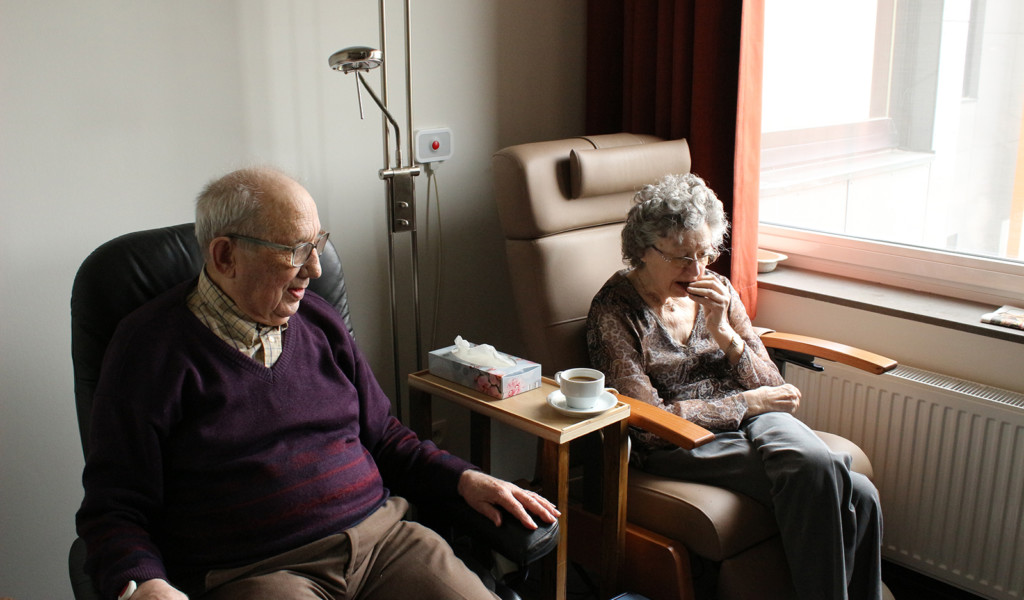
Watching your mother or father age and slowly lose their independence can be challenging, if not heartbreaking. You grapple with issues like when is it time to step in and offer assistance, and how much assistance do they need? Are they able to drive themselves to their doctor’s appointments? Can you honor their wishes and keep them in their home? These are not easy issues to consider, and Just Like Family Home Care is here to help.
Maintaining Familiar Surroundings
It can be a very difficult transition for your loved ones to have to leave their homes in order to receive the care they need. Mom may already be upset because she is losing her mobility, mental capacity, or ability to remain 100% independent. Dad knows it’s important for Mom and him to enter their golden years in familiar surroundings, like the home they created for themselves. The neighborhood, their place of worship, their social groups and friends are central to their happiness. So why not try to keep them where they will prosper the most.
Of course, they will need assistance with day-to-day activities of life – meal preparation, grocery shopping, housekeeping, exercise assistance, bathing, dressing, driving, caring for pets – the numerous things that compose our daily lives.
Fortunately, this is where Just Like Family Home Care comes in. We can offer the help and support your loved ones need by referring qualified caregivers to come to their home and help them live the most independent life they are able to. Caregivers can also provide immediate help in case of an emergency, such as a fall or a sudden illness. We can provide short or long shifts, or even around the clock care.
Conversation and Companionship
An important role of an in-home caregiver that is often overlooked is companionship and friendship. Oh, just to have someone to play cards with, to walk and talk with, or to watch their favorite shows together! A private caregiver is, perhaps more than anything, a friend to people who truly need one.
Peace of Mind
By having our referred caregiver assist your loved ones, you should find relief in knowing your parent is being cared for in a one-on-one environment in the comfort of their own home.
Now that’s peace of mind!
For more information visit us at http://justlikefamilyhomecare.com or call us at 239-431-6661.
Aging at Home
August 13, 2019
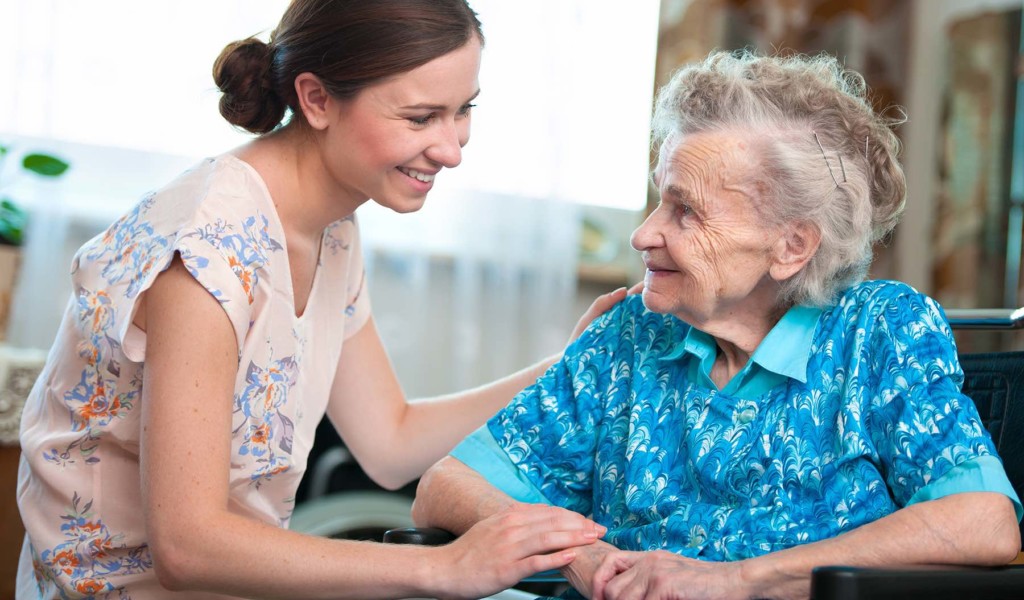
Aging at Home
Recent surveys show that nearly 90% of seniors hope to and plan to live in their current home for as long as they live, now termed “aging in place.” Some have lived in the same house for years or moved into their current home after retirement, to be closer to family, moved to a smaller home that is easier to maintain, or to have access to activities that suit their current lives. In talking to our clients, and our family members, we found that their experience and motivation mirrors what current research says relating to the benefits of staying home, even in cases where some outside assistance is needed for short or long term.
Benefits of Living at Home
Comfort, independence/control:
When a Senior stays in their residence, they are in a place that is comfortable and familiar to them, with neighbors and friends accessible. They make their own rules, eat what and when they want and watch the TV shows they want. They relish the independence they have, and many dread the thought of someone else setting their schedules. They also feel safer in their own home, both in terms of the physical comfort of getting around a place they know very well, and in having neighbors who can help. A sense of pride is often mentioned by seniors who retain their independence. Finally, research tells us that those with medical issues recover more quickly and retain their health after recovery when home-based.
Personalized care
If a senior needs assistance, that care is provided one-on-one. That undivided attention for only what is needed versus every resident getting the same treatment is often mentioned as a preference of seniors. Also, the attention is scheduled for when the senior wants the help, not when it is convenient to a caregiver juggling many others.
Affordability
The cost of senior care in nursing homes or assisted living centers can be very high. A recent study showed the average costs of assisted living and nursing homes can range from $50,000 to $100,000 a year. Staying home and having assistance when needed is relatively inexpensive, especially since you only pay for the hours you need. 24-hour care is still possible in the home if needed, but significantly less expensive than paying for a room in a facility.
Human Companionship
Having friends and family accessible is one of the most popular responses as to why seniors prefer staying in their home. Whether they chose to stay in the family home near family and friends, or if they move into a neighborhood heavily populated with seniors, having interaction with others is critical. Personalized caregivers can play a role in the socialization of the senior, but that interaction can be scheduled to fit the senior’s wishes, rather than a center’s schedule.
Animal Companionship
One issue that many seniors bring up when discussing their living preferences, is their desire to have a loving pet in their home. A dog or cat is the most common pet. For those with dogs, they need to get out and walk the dog which is especially good for the senior, providing not only exercise but the ability to connect with neighbors.
New Technologies
In today’s technology and delivery based world, there are many new options to help seniors “age in place.” In a recent blog post, we discussed the use of technology to have face-to-face conversations with family and friends. Other technologies that can provide the senior with access to needs:
- Technology-based ‘emergency alert’ systems, also discussed in a prior blog.
- Access to voice-activated technologies such as televisions and telephones that run via voice commands.
Fortunately, more and more seniors and their families are finding that home care is possible, especially with the help of companies like ours. Just Like Family Home Care is proud to offer Lee and Collier Counties referrals for sensitive, discreet personal care for our clients to help them better enjoy life at home. Care providers are carefully selected for their compassion, professionalism, and dedication to providing the best care possible.
Disclaimer: The blog entry above has been created utilizing different online sources. The blog entry has not been verified by a doctor. Please note that conducting the above-mentioned activities is at the individual’s own risk and responsibility. Please always consult a doctor before exercising or doing any physical activity, especially to avoid injuries or harm due to unknown preconditions. Just Like Family is not responsible for any injuries while conducting the above activities.
Plan for Help After Surgery or Hospitalization
April 12, 2019

Imagine a close relative going through knee surgery. By all accounts, the surgery is to be simple and the patient should be able to be home that day and even walk up the stairs. Unfortunately, that wasn’t the outcome. The patient was hospitalized overnight and was incapacitated for days. While rare to have complications, many experts recommend thinking ahead about the care needed after surgery or hospitalization and for unexpected outcomes. Different types of surgery require different plans. So, the relative’s knee surgery did result in problems climbing stairs, and a patient’s shoulder surgery can restrict the use of the arm completely. If the surgery or procedure is planned, patients are encouraged to discuss the recovery with the doctor or medical provider and identify what can be planned for.
Things to Consider
A recent WebMD posting suggests the following examples of issues to think about, that may sound obvious, but can help patients understand the types of plans needed:
- Consider the location of the bedroom. If upstairs, consider sleeping downstairs during recovery. Bring any bedding downstairs before the surgery, along with personal hygiene items and medications.
- Stock the pantry before the procedure, especially if there are special food recommendations from the doctor.
- Identify and obtain any equipment that is recommended, and ask the insurance company if that is a covered expense. New York Times reporter, Lesley Alderman, wrote about home recovery and pointed out that the patient may need special equipment, such as ‘a walker, a bath seat, or a commode’ to help ensure the patients do not injure themselves during recovery. Consider if the patient could need any outside help using that equipment.
- In addition to addressing post-procedure planning, the National Institute of Health (NIH) publication regarding “Taking Care of Yourself After Surgery” provides suggestions for post-op care that is more medically specific. Let’s look at some of those issues, and how outside assistance may be helpful.
- Managing Pain: NIH recommends clear communication with the doctor regarding how to manage any surgical pain. In most cases, the patient can handle this. However, if the pain medicine, or other ordered medications, need to be provided via shot or intravenously, family members will likely need outside assistance.
- Surgical Site and Incision Care: NIH recommends following the doctor’s orders, but also keeping an eye out for separation, bleeding or signs of infection. Despite the perception that wound care is “simple,” there are exceptions, such as a surgical site that isn’t accessible to the patient, or a family member/friend is just not comfortable dealing with wounds, or the patient is not comfortable with non-trained family/friends playing this role. Outside assistance can come in for a short period and perform this service.
- Activity: NIH encourages patients to “get up and be active as soon as possible” which encourages faster recovery. NIH also reminds us that the doctor will likely give “specific activity instructions” which should be followed, and which will likely limit the lifting of objects heavier objects. Often, we find that those who have had surgery, however, need assistance in fulfilling this recommendation. As an example, those with knee surgery, like our example above, may need help walking just a few steps, or walking with crutches. Or, someone who has shoulder surgery may need help bathing and dressing. Health care staff can be of great assistance, in a professional and supportive way.
- Consider in-home care if family members aren’t available regularly. Just Like Family Home Care has nurses available to provide superior care in-home or temporary accommodation setting. They can provide daily drop-in care, day or night care, extended hourly and after hours house calls. We offer our clients flexible hours because we understand that it may be difficult to gauge how much care they will need following surgery. Some clients may require more hours and some may need fewer than anticipated. Your nurses work with your surgical team to customize a plan of care that fits your needs. There are no contracts and no minimum hours required: our clients control the schedule.
The above, and our own experience results in a recommendation that planning, when possible, help make recovery from surgery or other hospital stays, much easier. Good communication with the medical staff, learning what to expect upon release and for the few weeks after the event, is critical. Planning ahead for higher level skilled care, such as nursing, and more generic care, such as a home health aide, can make the process much easier. But, even if not planned, patients and family/friends should be comfortable asking for outside help. Those who work in this field love to help and can make recovery a much less frightening experience.
Recovering from Home
One final point, research from the American Academy of Orthopedic Surgeons indicates that recovery from home, is equally positive for those who live alone and those who live with others. The Rothman Institute in Pennsylvania conducted a study that showed that with the “emotional benefit for patients recovering in familiar surroundings, and the lack of difference in pain or complications, discharge home is appropriate for the clear majority of patients.” While the study targeted those having joint surgery, other studies show the same. Obtaining outside assistance, such as health care and nursing staff, at home, was encouraged.
As professionals in the field of health care, and in overall home health care support, we do encourage patients and families/supporters to consider recovery from home and do encourage pre-planning when possible.
Disclaimer: The blog entry above has been created utilizing different online sources. The blog entry has not been verified by a doctor. Please note that conducting the above-mentioned activities is at the individual’s own risk and responsibility. Please always consult a doctor before exercising or doing any physical activity, especially to avoid injuries or harm due to unknown preconditions. Just Like Family is not responsible for any injuries while conducting the above activities.
It’s okay to ask for help with caregiving!
January 31, 2019

As family members, and as friends, many of us are called upon at some time to consider assisting those close to us in connection with an illness/surgery or aging. As we take on those roles, we often feel guilty if we become overwhelmed. According to experts in these fields, it is important to consider the family/friend caregiver’s own needs as well as those who are being helped. Common caregiver issues include:
- Feeling overwhelmed and trapped, by the situation and/or the time involved,
- Feeling like other family members are being abandoned,
- Feeling afraid of dealing with medical issues,
- Feeling as if self-care and other personal issues are suffering, and
- Feeling guilty for feeling any or all of the above!
A recent web posting from AARP (American Association of Retired People) pointed out that family/friend caregivers “have a lot of reasons for not arranging respite for themselves. Among them: guilt, money, being too busy in the present to plan for the near future and reluctance to change their loved one’s routine.” The site goes on to say, “every caregiver needs a caregiver — someone who will care for your loved one for a few hours, days or weeks, so you can take care of yourself.”
Many articles discussing home health care and ‘aging at home’ discuss the need for a plan for the caregiving situation, which addresses these issues. The National Institute on Aging, at this site, https://www.nia.nih.gov/health/caregiving, provides several discussions regarding planning for the caregiving situation, as well as finding help when overwhelmed. Another page on the NIA site provides more tips for caregivers needing help taking care of themselves, https://www.nia.nih.gov/health/taking-care-yourself-tips-caregivers.
One other site, dailycaring.com, has many resources for the caregiver who is feeling overwhelmed. This link, https://dailycaring.com/how-to-be-ok-with-getting-caregiving-help/ provides specific guidance on encouraging caregivers of older adults to seek help. They conclude with:
“Did you know that getting help will actually make you a better caregiver? That might sound crazy, but it’s true.
If you get help, you’ll reduce stress, cut down your to-do list, and be able to regularly take time for yourself. This is guaranteed to improve your health and mood. When you’re feeling better, you’ll be more patient and caring with your older adult.”
While much of the information here, and online, deal with caregivers for older people, much of the information equally applies to those providing caregiving after injury or surgery. For those caregivers, there are usually specific concerns about dealing with medical issues. While the need for a plan still applies, the caregiver needs to be up-front about their ability and/or willingness to handle issues from bathing to wound care. Professional assistance is available and can be provided for short periods of time.
Just Like Family Home Care is proud to serve the community by providing short and long term assistance, including providing respite care to help the caregivers. As family/friend caregivers need assistance, we stand ready to be part of their team and plan. Most importantly, Just Like Family encourages family/friend caregivers to remember to take care of themselves.
Before hiring a caregiver…
March 27, 2018

Facing the reality of finding a caregiver for a loved one can be very challenging. Trusting a person or company to take care of your family member is a big decision and there are several things to consider before choosing.
Before you make the decision here are five things you should do before selecting the a caregiver:
- Evaluate your needs
Determine what kind of services your loved one will need and how often.
- How much time does the person in need of the service require supervision? Can the person be left alone for a certain extend of time?
- Do you need a certified nurse to provide medical needs or a certified health care aid? Do you prefer a certified personnel? (This might be important for your budget)
- Does your insurance cover any of the caregiver services?
This will determine your budget and help you decide what kind of services you can use.
- Perform a background check
After you understand your needs and budget, make sure the person caring for your family member is someone you can trust. A background check will give you peace of mind knowing that no person with criminal record will enter your house and treat your loved one.
- What are your expectations
Help your caregiver understand what you expect
- Many times, caregivers and caretakers will have different expectations. To avoid any miscommunication, make sure to write down anything that is important to you and discuss those points with the caregiver. This will help prevent any future misunderstanding.
- Make sure to involve the care receiver in the decision process
- Give your loved one the opportunity to be heard. This is a very important decision in a difficult time which requires a lot of sensitivity.
Just Like Family Home Care offers the ultimate peace of mind when choosing a care provider. Our expert consultation will help you and your loved ones select the right services for your budget and refer fully qualified caregivers. Each caregiver we refer is hand-selected and has had their background thoroughly checked.
